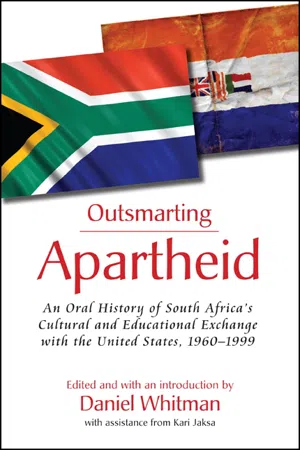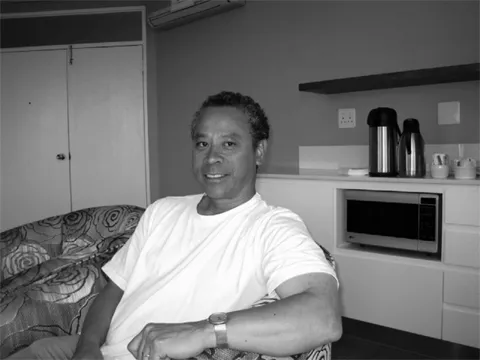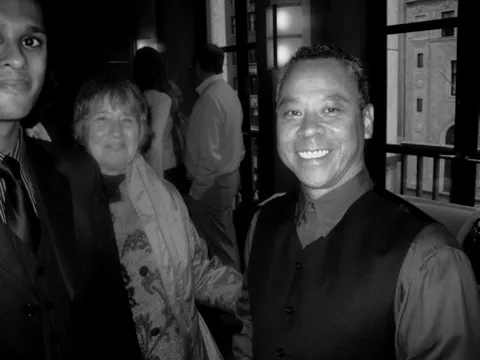![]()
Part 1
ARTS
South Africa’s transformation from apartheid was as much a state of mind as it was power, demography, strategy, and events. The five interviews here touch on music, poetry, theater, and dance and contain a tale of diplomacy’s role in breaking the cultural boycott against the country. The speakers span skin pigments, genders, and nationalities.
The day of FRANKLIN LAREY’S interview in Cape Town, he mentioned an upcoming debut in Carnegie Recital Hall, New York. I was thrilled, three months later, to be in the audience. SINDIWE MAGONA’S formidable trek from a Cape township to the United Nations left her poet’s essence fully intact. MALCOLM PURKEY recounts—with irony and understatement—the creation of a remarkable theater and platform for social change. ADRIENNE SICHEL’S keen observations take us from Johannesburg to New York City in her life endeavor of chronicling the dance forms that gave South Africa its world renown in that discipline. Finally, BROOKS SPECTOR walks us through an arduous year of negotiation in restoring visiting performing arts to a boycottweary, now racially mixed public.
All five either benefited from U.S. government cultural exchanges or administered them. The U.S. taxpayer—unsung hero in the tale—also reaped impressive benefits.
Brahms, from Malmesbury to Carnegie Hall
Franklin Larey
“Education Was My Weapon”
Sindiwe Magona
Market Theatre Co-Founder Discovers the American Stage
Malcolm Purkey
Dance, Too, Can Change a Society
Adrienne Sichel
“Do You Sell Stamps or Don’t You?” (Breaking the Cultural Boycott)
Brooks Spector
![]()
Brahms, from Malmesbury to Carnegie Hall
FRANKLIN LAREY
Pianist, Professor
Fulbright Scholar, University of Cincinnati, 1986
Initial Interview Date: February 11, 2010, Cape Town
Franklin Larey
Franklin Larey (right) on the day of his recital in New York’s Carnegie Hall
DW (Dan Whitman): It is February 11, which happens to be the twentieth anniversary of the release of Nelson Mandela from prison.
LAREY: It’s a very special day, yes. I think it was momentous. It’s probably the event that saved our country. I will probably never forget the day because I was still in the U.S. at the time, playing in a recital that day at the university in Charleston, Illinois. None of us knew that Nelson Mandela was going to be released until the day of. Then it was announced on television, and I had to play my concert in the afternoon. I dedicated my concert to Nelson Mandela and watched some of the event on television later. It was quite amazing—extraordinary.
I will never forget the works I played that day, works by Prokofiev: one of the War Sonatas, interestingly. I also played a standard work, a very beautiful work, by Schumann called “Humoresque,” and a Haydn sonata in A flat. It was a wonderful day for me.
Overall, I cannot see South Africa where we are today without Nelson Mandela.
DW: Tell us about yourself and the career that you have had, when it started and how it’s going now.
LAREY: I was born in Malmesbury, a very small town just outside of Cape Town, about a 45-minute drive. I always loved music, but there were no resources in our schools at the time and no provision made for classical music studies for black students. As the children grew up, and more and more of us were ready to go to high school, my dad decided that the family should move to the town, where there was a high school. But still, there was no music program.
The town had a tiny one-room library for blacks. They had virtually no music or recordings. I got to know the librarian very well. The library was only open on certain days of the week, and she started ordering music for me from the main library in Cape Town. This was all before I started playing. So, I listened to a lot of music, and I knew a lot of the music already before I started playing.
Then, a complete stroke of luck: a new neighbor moved in next to us who played the piano. I started sitting outside listening to him play. He was a self-taught pianist; he’d had a few lessons, but no formal music studies. He could play the piano but was not a concert pianist.
I knew so many works. I went through all of the Beethoven sonatas. I knew them before I could even play them. I had a few favorite ones that I really liked. I think I continued nagging my parents for lessons. On my sixteenth birthday my parents took me next door and said, “This is your birthday present; you could start lessons with our neighbor.” We didn’t have a piano at home, so I had to walk a few blocks to a friend of the family who had an old upright piano, and that is where I started practicing. When I had my first lesson, it was enormously exciting for me. I think I went through beginner books by Schaum very quickly, like one book a week, and just finished it.
I admire my neighbor for the decisions he took. He realized that I had talent. Then, after only about two or three months, he suggested that I go to a trained music teacher because he couldn’t teach me enough. He arranged a meeting—I have all of this so vividly in my memory still—with my dad there and the new teacher. His name was Gideon Slingers. He listened to me play and agreed to teach me. He was coming to teach in Malmesbury as well. It was almost as if everything was working out very well for me. He was an enormous influence in my life. He was a trained, qualified music teacher. He had trained at the Hewat College of Education in Athlone.
My lessons with him were quite extraordinary, because he spent so much time with me. Sometimes he had me stay for lessons for four hours. I had two years left in high school when I started my piano lessons. Prior to the piano lessons I was determined to go into medicine, so I had all the science subjects. The moment I started piano lessons, I knew immediately that this was what I wanted to do. I enjoyed playing in public, and this is one of the things that Gideon taught me and exposed me to step-by-step. He was very, very, very good about it. He was an excellent choir director as well, so he made me the accompanist. That’s how I started playing in public, as an accompanist first.
My school teachers were all upset with me, because I spent most of my time at the piano. I remember I would go practice at our family friend’s house immediately after school and get home only after six o’clock, after practicing for a very long time.
I did practice a lot. I had two years to prepare for university auditions. I remember when I applied to the University of the Western Cape (UWC), my desire was really to go to the University of Cape Town (UCT). But, it was still segregated.
DW: Was UCT entirely segregated? Were there any exceptions made?
LAREY: The government made exceptions. Black students could study there if there weren’t any programs at the historically black institutions. My parents could not afford tuition, so I had to go into music education.
DW: UWC had more of an educational component?
LAREY: Yes, and a broader arts/humanities combination of courses. There were quite a number of nonmusic subjects I had to do. It’s similar to studying for a BA degree with two majors and then taking all the courses that lead up to the two majors in the final year; whereas the music degree was constructed with predominantly music subjects, with one nonmusic subject in the first year, and that’s it.
It was a political decision. As much as I desired to go to UCT, I admired the place already—it’s an excellent institution with an excellent school, and the music department at UWC was very small—but I think I made the right decision. It was the right environment at UWC. Politically, I would not have survived at UCT. Something that’s quite extraordinary now that I observed while I was at UWC was that every single year at least five or so, and sometimes one year even more, students who had initially registered at UCT who would switch over to UWC because they couldn’t survive there.
A lot of those transfer students came back very bitter, angry, and not very happy. In South Africa, people make serious charges about what happened to them at the time. Some became my good friends, and they all reported to me how much happier they were at UWC. I think a lot of it—I am not saying this is what they related to me—was the fact that at that time, with us being so segregated, they felt thrust into an environment they didn’t know for a part of the day, and then had to go back to something entirely different for the rest of the day.
I was very happy at UWC and studied there with a wonderful pianist in the department, Bruce Gardiner. He was a fantastic pianist and loved to perform. He was also the head of the music department. I worked with him for my entire undergraduate education. I admired his loving to play and perform so much. He did all the right things with me technically and developed that love.
Then came the opportunities to perform, a lot of opportunities. We had a lot of lunch-hour concerts and evening concerts on our campus. I performed in many of those. I played my first solo recital. This makes me laugh. I have a photograph of this in my studio now. We had no facilities at UWC. We had no grand pianos to play on, only upright pianos. We had our lunchtime concerts in a lecture hall. We would put an upright piano on a little dolly—what’s called here “wheels”—and move it half an hour before into the lecture hall, squeeze it in between the front row of seats and the lectern, give the concert, then wheel the piano back afterward.
DW: Didn’t that affect the tuning?
LAREY: Yes, but that’s how we’d have concerts. I always dreamed, at that time, about playing on an actual concert grand piano. I’d never touched one up to then, and I played a lot. Then I became the first student at the university to actually register for and pass the Royal Schools of Music licentiate exam. You do a performance licensure, and that’s a professional credential. This was extraordinary for me at the time, because I was enrolled in an education degree, even though my heart wanted me to be on a concert stage. That is why I pursued that at the same time. So my playing was at a much higher level than they expected for the education program.
After graduating, I really, really, really wanted to go to UCT to pursue a performance degree. But I didn’t have funds and I couldn’t go. I returned to UWC to do a one-year secondary teacher’s diploma, which is a formal credential to become a qualified teacher. My heart was set on becoming a music teacher.
I graduated with my BA in music with distinction. My other major, of course, was psychology, which I found enormously helpful and fascinating and interesting.
Those were difficult years—my undergraduate education—because we had student unrest, we had class boycotts. I remember my second year; I think I had formal instruction for six months of the year only. There were several disruptions.
DW: UWC was a hotbed, a place where political conflict was very high.
LAREY: Exactly. I remember—this was extraordinary. It was so difficult for me to convince my friends that I had to practice because during the class boycotts, we were not allowed to have any academic time; you were not even supposed to read academic stuff. You were supposed to be at the meetings all the time.
I stayed in residence on the campus. That, too, was quite an experience because that’s where all the political discussions kept going all the time, every day. I used to practice right after dinner every day from six until midnight. Once, during one of the times of unrest, I was thrown out of a practice room because I was not supposed to play. I was told at the time, “You’re playing bourgeois music; it’s Western music.” They also trashed the piano. So it was very difficult. It was trying for me.
One thing that still makes me smile today—I don’t think students are meant to be logical—is that during student unrest and student upheaval times, it was not okay to play the music of Chopin or Mozart; but when we had calmed down a bit and were back in the classrooms, it was okay. I sometimes played the piano in the lounge area of the residence. When we were back in class, everyone wanted me to play Chopin, Beethoven. Then it was okay; during an upheaval it was not.
DW: When you say “they,” these would have been the political activists?
LAREY: Yes. They patrolled everything and made sure that nobody deviated. But for me, it has to do with the nature of the discipline. I tried to explain it to my friends. They can pick up books, they can get notes, and they can read. I cannot make up for lost time. I cannot walk into an examination room having not practiced a sonata by Beethoven for two weeks. It’s not enough time. Technically, you lose everything. You lose so much if you don’t keep practicing.
DW: It’s not intellectual; it’s physical.
LAREY: Those were difficult times. I became involved in politics. I was the chair of the music society of the university for two years. I remember one year when they ordered the residences closed and wanted all of the students to leave. In fact, the university sent letters to our parents about the decision. So, all of our parents arrived in droves to get us.
We refused to leave the residences, and they allowed us to stay. My dad made me decide. I could go home with him or I could stay. I offered to stay, which was quite remarkable because at that time there were also conflicts within families and communities.
DW: So, the act of staying was in fact a protest.
LAREY: It was quite, quite frightening. Every morning there would be a count, and some of the student leaders in the residences would be gone, arrested in the night. They wou...


